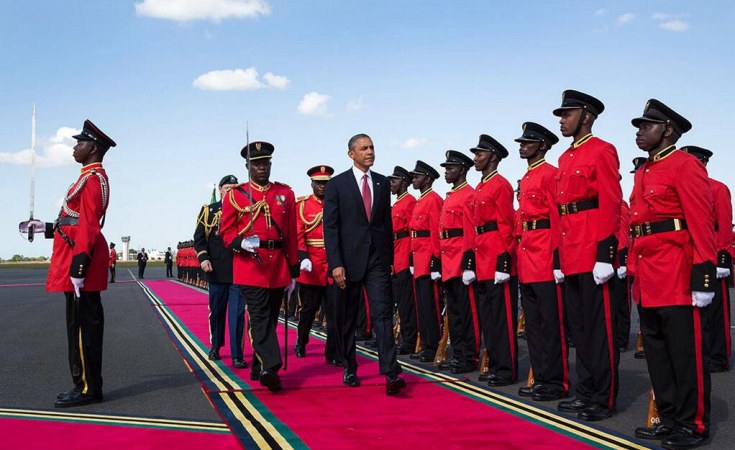Washington, DC — Late last month as President Obama was launching the 'Power Africa' initiative to support Africa's energy sector, legislation was introduced in the U.S. House of Representatives with bipartisan support to accomplish the same goal.
Supporters say announcement of the legislation two days before President Obama's speech unveiling the White House program was not a Congressional attempt to upstage the President but an embrace of the White House effort.
"Powering up in Africa is often prohibitively expensive," said Rep. Ed Royce (Republican-California), chairman of the House Foreign Affairs Committee, when he introduced the bill. "For example, the U.S. Embassy in Liberia is forced to spend $10,000 per day to generate electricity; obviously few small African businesses would be able to afford such a power bill, he said."
Joining Royce in sponsoring Electrify Africa Act of 2013, H.R. 2548 are Eliot Engel (Democrat-New York), the Committee's ranking Democrat, Chris Smith (Republican-New Jersey), who chairs the Subcommittee on Africa, and the Subcommittee's ranking Democrat, Karen Bass from California.
Like the Obama program, the bipartisan legislation would establish a U.S. strategy to support affordable, reliable electricity in sub-Saharan Africa. The goal is to improve economic growth, health and education in Africa and to promote job creation in the United States through greater exports.
The two initiatives embrace positions long advocated by the ONE campaign, the Center for Global Development and others who point to the lack of power as one of the greatest constraints to growth and development across Africa.
The numbers are staggering – some 550 million people on the continent without access to electricity, including 90 million children who attend schools without electricity.
According to a House press release, the legislation:
- requires that the Administration create a comprehensive strategy to help increase electricity in sub-Saharan Africa;
- encourages the U.S. Agency for International Development (USAID) to use existing tools such as loan guarantees, partnerships and grants to increase electricity in sub-Saharan Africa;
- directs the Treasury Department to persuade the World Bank and African Development Bank to increase electrification investments in sub-Saharan Africa; and
- Instructs the Overseas Private Investment Corporation to prioritize electrical sector investments in sub-Saharan Africa.
A section-by-section of the legislation is available HERE.
"This bill will be a game changer for those forced to deal with unreliable energy and costs that far exceed that found elsewhere in the world," Congresswoman Bass said.
"Women will no longer have to give birth by candle or flashlight, children will have light to go to school and to study, and businesses will be able to produce products for trade – both regionally and to far-off destinations like the United States and Europe."
Bass said she was committed to working with Royce "to move this bill forward" and with the administration "to ensure that the people of sub-Saharan Africa have the electric power they need to help pull them out of poverty."
The House legislation - coupled with passage one week prior by the Africa Subcommittee of the Senate Foreign Relations Committee of the Increasing American Jobs through Greater Exports to Africa Act of 2013 - is a welcome indication of an emerging consensus on how to engage Africa that it is bipartisan and bicameral, with backing on both sides of Pennsylvania Avenue.
The efforts to address impediments to growth as a means of encouraging development and trade represent an important step forward for U.S.-Africa policy which has been defined for the past 13 years largely by the Africa Growth and Opportunity Act (Agoa).
Passed under President Bill Clinton in 2000, Agoa gives preferential access to American markets to qualifying African countries. The largest beneficiaries are textile manufacturers who take third party fabric from Asia and assemble garments in Africa for duty free export to the United States.
The legislation, which was precedent-setting at the time of passage, has played an important role in shaping economic relations. But while the program has benefited nascent clothing exporters in places like Mauritius and Lesotho, the benefits of duty-free access and low-labor costs in other countries have not translated into many jobs.
That is largely because the prohibitive price-per-kilowatt-hour of electricity often wipes away any potential manufacturing advantage.
In Liberia for example, where the price per kilowatt hour is $.54 cents – one of the highest on the continent - the one factory that opened to take advantage of Agoa trade preferences had to close.
Supporters expect the Africa power initiative to breathe life into Agoa and encourage greater exports under the trade preference program as the cost of electricity is reduced.
K. Riva Levinson is the founder and managing director of KRL International LLC, a consultancy dedicated to ork in the world's emerging markets. She has worked in Africa for more than 20 years and has been an advisor to Liberian President Ellen Johnson Sirleaf since 1996.
RELATED: Africa: Beyond Trips - to Trade and Investment.
For more on Power Africa, see Obama Initiative Aims to 'Light Up' Africa.


